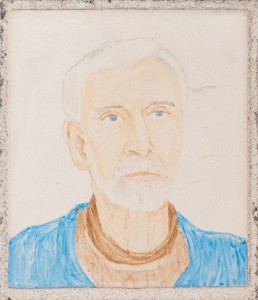The Phenomenology of Everyday Life, the unbranded brand of impromptu activity, proto-YouTube, beginning around 1960, of documenting anything and everything, the less obviously consequential the better, extended from a disposition toward collecting oddments (from baseball cards to bottle caps) gathered before, in the 50s, and likewise had a lot to do with recording devices. Somehow the record keepers have never gathered the strands––and no one yet knows the full import––of the sundry manifestations, in visual art, writing and general culture, of this passion to look, listen and record.
 Bill Berkson
Bill Berkson
Edwin Denby
George Schneeman, Edwin Denby, 1977, fresco on cinder block. Private Collection, New York
Once when we were having lunch at the Oyster Bar in Grand Central Station, I complained to Edwin about hearing myself on a tape of some recent poetry reading. “Yes,” Edwin said matter-of-factly in his customarily soft, slightly gravelly voice, “that resentment tone.” Thinking back on it over the years, I may not have understood the intriguingly commiserating aspect of Edwin’s remark.
The Question of Taste: Bill Berkson
Bill Berkson is a poet (originally associated with the New York School) and critic who’s been writing about art since the 60s. His books include The Sweet Singer of Modernism and other Art Writings, which Dave Hickey called “an indispensable text for anyone interested in late-twentieth-century culture.” In this dialogue with Jarrett Earnest, Berkson digs into the democratic roots of his own taste:
When people like you and I were growing up we were immersed in what is often considered low culture, but one cultivated specific habits, tastes, within what was generally available. In high school I began to meet people who hated modern life and the culture that went with it. They wanted to live in the Renaissance; everything had been downhill for them since 1700 or whenever. They wanted no part of our modern vulgarity, whereas I was so deeply immersed in it I came to fine literature quite late. I read comic books and pulp novels if I read anything at all, and whatever was required for book reports, you know, and I watched endless movies, and it’s like what Creeley says in that lovely poem: I did, maybe still do, have “a small boy’s sense of doing good,” and “ride that margin of the lake.” A small boy’s notion is that of a knight on horseback by the sparkling water—in Idylls of the King perhaps, but no, it’s Robert Taylor in love with Elizabeth Taylor in a Technicolor Ivanhoe. To disdain such a homegrown culture would be untrue; instead you develop a taste for what’s great within it, according to what you really know and go for.
